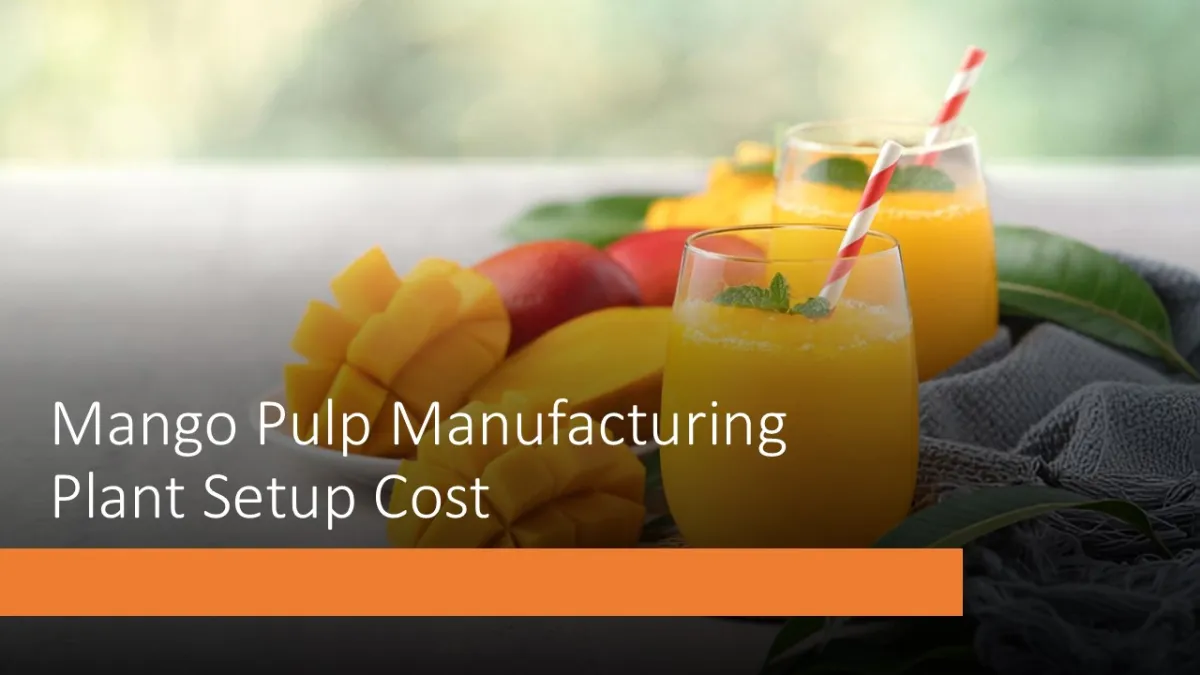
Mango Pulp Manufacturing Plant Setup Report 2025: Cost Analysis, And Business Plan
Setting up a mango pulp manufacturing plant involves sourcing quality mangoes, installing pulping, pasteurization, and packaging machinery, and ensuring hygienic processing standards. The plant should be equipped with cold storage facilities, waste management systems, and compliance with food safety regulations to maintain product quality and export standards.
IMARC Group's report, titled “Mango Pulp Manufacturing Plant Project Report 2025: Industry Trends, Plant Setup, Machinery, Raw Materials, Investment Opportunities, Cost and Revenue,” provides a complete roadmap for setting up a mango pulp manufacturing plant. It covers a comprehensive market overview to micro-level information such as unit operations involved, raw material requirements, utility requirements, infrastructure requirements, machinery and technology requirements, manpower requirements, packaging requirements, transportation requirements, etc.
Request for a Sample Report : https://www.imarcgroup.com/mango-pulp-manufacturing-plant-project-report/requestsample
Mango Pulp Industry Outlook 2025
The mango pulp industry in 2025 is witnessing strong global demand driven by health trends, clean-label preferences, and its versatile use in beverages, dairy, baby food, and bakery. Asia-Pacific, especially India, dominates production and exports, with rising investments in processing and packaging innovations. However, the sector faces short-term challenges like price crashes from oversupply, climate impacts on fruit quality, and pest issues. Despite these hurdles, long-term growth remains promising, supported by expanding applications, rising exports to Europe, North America, and the Middle East, and increasing investments in infrastructure and product diversification.
Key Insights for Mango Pulp Manufacturing Plant Setup
Detailed Process Flow
-
Product Overview
Unit Operations Involved
Mass Balance and Raw Material Requirements
Quality Assurance Criteria
Technical Tests
Project Details, Requirements and Costs Involved:
-
Land, Location and Site Development
Plant Layout
Machinery Requirements and Costs
Raw Material Requirements and Costs
Packaging Requirements and Costs
Transportation Requirements and Costs
Utility Requirements and Costs
Human Resource Requirements and Costs
Capital Expenditure (CapEx) and Operational Expenditure (OpEx) Analysis:
Project Economics:
-
Capital Investments
Operating Costs
Expenditure Projections
Revenue Projections
Taxation and Depreciation
Profit Projections
Financial Analysis
Profitability Analysis:
-
Total Income
Total Expenditure
Gross Profit
Gross Margin
Net Profit
Net Margin
Key Cost Components of Setting Up a Mango Pulp Plant
-
Land and Site Development: Cost of land acquisition, site preparation, and utilities setup.
Plant & Machinery: Pulping machines, pasteurizers, evaporators, sterilizers, canning/packaging units, cold storage, boilers, and quality control equipment.
Raw Material Procurement: Fresh mangoes, preservatives (if required), packaging materials (cans, aseptic bags, pouches).
Infrastructure & Utilities: Buildings, water supply, electricity, waste treatment, refrigeration, and logistics.
Labor & Manpower: Skilled and unskilled labor, technicians, supervisors, and administrative staff.
Regulatory & Compliance: Food safety certifications, licenses, environmental clearances.
Working Capital: Inventory management, transportation, distribution, and marketing expenses.
Economic Trends Influencing Mango Pulp Plant Setup Cost 2025
-
Rising Input Costs: Higher prices of raw materials, packaging, and energy increase overall setup and operating expenses.
Inflation Pressure: Though moderating, food and fuel-driven inflation still impacts procurement and utilities.
Currency Fluctuations: A weaker rupee raises the cost of imported machinery, technology, and fuel.
Government Incentives: Schemes like PLI, PMKSY, and Mega Food Parks reduce capital burden through subsidies and tax benefits.
Technology Integration: Automation and Industry 4.0 tools raise upfront CapEx but lower long-term OpEx.
Land & Compliance Costs: Industrial land prices and regulatory clearances add to capital requirements.
Growing Market Demand: Expanding food processing sector provides scale advantages, improving long-term ROI.
Challenges and Considerations for Investors
-
Seasonal Dependency: Mango availability is limited to harvest seasons, requiring strong cold storage and supply chain planning.
Raw Material Volatility: Oversupply or poor crop quality (due to pests, climate change, or rainfall) affects pricing and pulp yield.
High Initial Capital: Significant investment in machinery, land, cold storage, and compliance can strain finances.
Regulatory Compliance: Strict food safety, quality certifications, and export standards demand ongoing investment.
Global Competition: Competing with other mango-producing countries on price and quality is challenging.
Export Risks: Currency fluctuations, trade policies, and logistic disruptions impact profitability.
Consumer Trends: Growing demand for organic and clean-label pulp requires product diversification and innovation.
Browse Case Study :
Mango Juice and Pulp Manufacturing : https://www.imarcgroup.com/insight/sweet-success-a-financial-model-for-mango-juice-and-pulp-plants
Conclusion
The mango pulp industry presents strong growth opportunities driven by global demand, clean-label trends, and expanding applications. While challenges like seasonal dependency, crop volatility, and compliance costs exist, strategic investments in technology, infrastructure, and export readiness can ensure profitability and long-term success for investors entering this sector.
About Us: IMARC Group is a global management consulting firm that helps the world's most ambitious changemakers to create a lasting impact. The company excel in understanding its client's business priorities and delivering tailored solutions that drive meaningful outcomes. We provide a comprehensive suite of market entry and expansion services. Our offerings include thorough market assessment, feasibility studies, company incorporation assistance, factory setup support, regulatory approvals and licensing navigation, branding, marketing and sales strategies, competitive landscape, and benchmarking analyses, pricing and cost research, and procurement research.
Contact Us:
IMARC Group
134 N 4th St. Brooklyn, NY 11249, USA
Email: sales[@]imarcgroup.com
Tel No:(D) +91 120 433 0800
United States: +1-201971-6302
Legal Disclaimer:
MENAFN provides the
information “as is” without warranty of any kind. We do not accept
any responsibility or liability for the accuracy, content, images,
videos, licenses, completeness, legality, or reliability of the information
contained in this article. If you have any complaints or copyright
issues related to this article, kindly contact the provider above.


















Comments
No comment